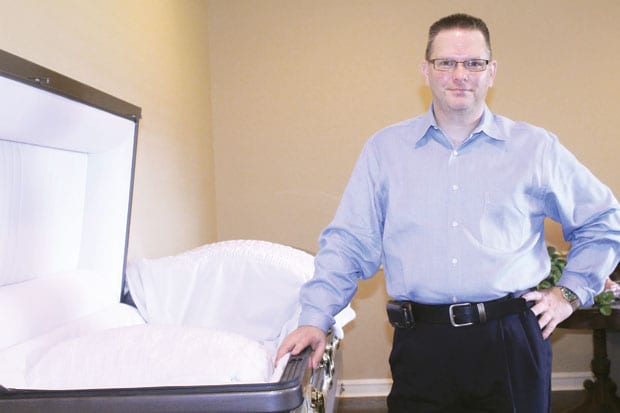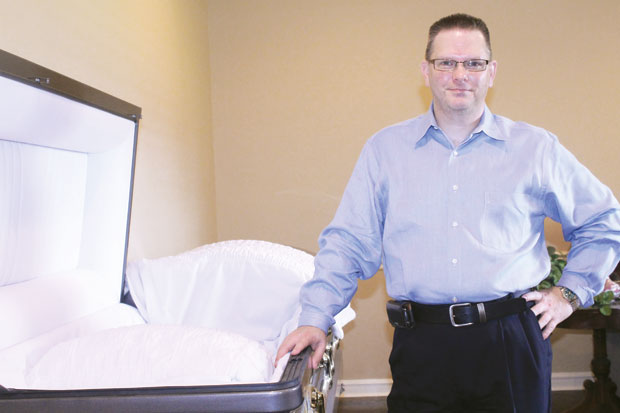For Bradley Sutton, a vocation in the funeral business wasn’t a job — it was a calling
To commemorate Pride Month, we’re kicking off a new series to highlight those in the LGBT community with interesting-yet-offbeat vocations — the kind guaranteed to break the ice at the next cocktail party. Queer Careers hopes to bring a face to those who work in unsung professions, from lesbian lion tamers to gay golf ball divers, we’ll find out how these folks chose their career and what keeps them coming back for more.
To inaugurate the series we tapped Brad Sutton, a veteran of more than 20 years in the funeral and embalming business. Sutton explains his passion for this “grim & bear it” profession.
— Jef Tingley
………
Name and age: Bradley V. Sutton, 42
Your queer career: Owner, North Texas Cremation Society
Is your career choice something you wanted to be when you grew up? I actually had a “calling” when I was about 7 years old. I always felt that the funeral business would be my life’s work. I also cut hair and barber part-time, but the funeral business is my main gig.
How did you end up on your career track? After graduating high school in Sherman, I did some research and found out that Dallas has a great learning institution specifically for funeral service called the Dallas Institute of Funeral Service (DIFS). Back when I enrolled, it was a 12-month program, and you had to take courses for both funeral director and embalmer; now you have the option to take one or the other. After mortuary school, I served an apprenticeship under another licensed funeral director and embalmer, and completed 60 cases for each of my licenses. I hold two licenses: a funeral director’s license and an embalmer’s license. I’ve been actively in the business for over 20 years now, and I’ve never looked back!
How do you describe your job to people at a cocktail party? I try not to bring up my vocation at parties. It freaks a lot of people out, or I get the curious one who tags along all night wanting me to talk about every case I’ve worked on.
What’s your favorite part of your job? I love being able to help people in need. It’s a great feeling to help walk people through this journey of dying, death and grief. It’s really not my job — it’s my passion.
And your least favorite part? Some people think that funeral professionals dress in fancy clothes and drive around in fancy cars all day long. My job is far from that. The stress level of having to pull together funerals and memorial services quickly is too much for some of us, and we burn out after a few years. Also the fact that occasionally I may have to go pick up a body that is already in advanced stages of decomposition doesn’t make my day pleasant by any means.
What are the most common questions you get when you tell people you are a funeral director and embalmer? [They] usually want to know what was the hardest case I’ve embalmed, or what was the most emotional case I’ve worked on. People are curious about the funeral business. I sometimes get asked about dealing with my own family when death occurs. I occasionally get questioned about the cremation process or embalming process in great detail. I try to answer all questions honestly, but with a little tact. When dealing with death, dying, funerals and cremations, there is no such thing as a stupid question. If you don’t know, you need to be informed.
What are the biggest misconceptions about your job/industry? Public opinion would portray us as a greedy, heartless business. That may be true in some places, but I have many professional peers in the area that are honest, caring people. Some people think that we steal gold teeth out of bodies, or steal body parts and sell them on the black market! I get tickled at what people think we’re capable of. At the end of the day, we are a business, and must make a profit to stay in business.
What’s one of your most memorable “on the job” stories? The great thing about my job is, no two cases are the same. Every day is a new day. Never say that you’ve seen it all, cause tomorrow you’ll experience something new that will top the last one. Early in my career, I was working a visitation of a woman who passed away at the age of 104. I heard a family member of the deceased become very emotional. I went to check on her, and put my arm around the grieving family member to console her. As I was hugging and consoling this person, through her tears and sobs, she told me that the death was “completely unexpected.”
How does your profession fit in with your love life? I don’t have a partner. Being the owner of a business that demands your attention 24-7-365 makes it hard to attempt relationships. I have lots of friends who have over the years gone with me to make body removals, when I needed an extra hand and [they have] actually liked the experience. I haven’t been on a date in years. Some people think that I lie when I say I can’t make dinner because someone died. It’s really true!
What’s a hidden talent or skill you possess that people would not expect given your vocation? My life is very full circle. Every skill or talent that has been bestowed upon me connects with another. I am blessed to be able to do hair and makeup. I was a church pianist and organist for many years — that comes in handy when the CD player goes on the fritz right before a service. I think that most people would be surprised to know that embalming is my passion. It’s becoming a lost art. Not many people are doing it, and as cremation takes a bigger place in our business, embalmers are not needed.
Do you know someone with a queer career deserving of a moment in the spotlight — even if it’s yourself? If so, send your suggestion via e-mail to jef@tingleycomm.com.
This article appeared in the Dallas Voice print edition June 20, 2014.



